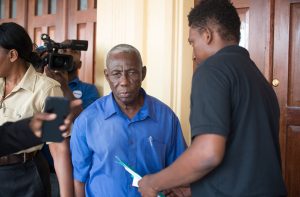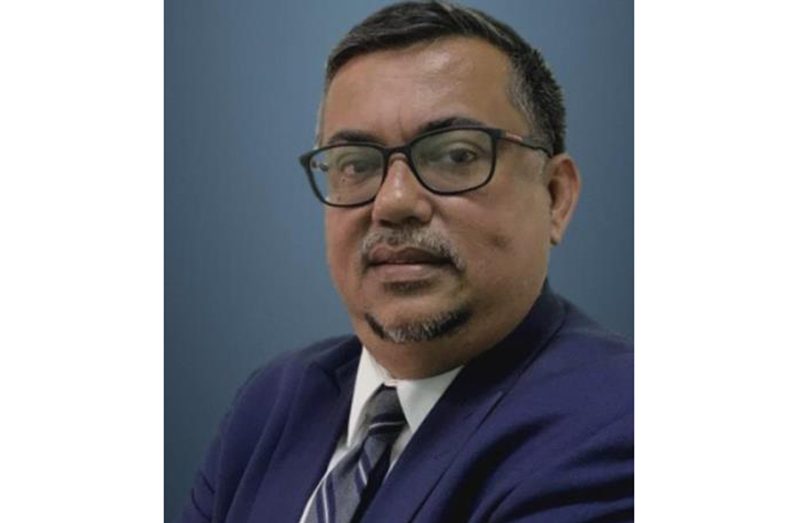By Richard Bhainie
THERE is a gamut of compelling reasons for the court proceedings pertaining to alleged electoral fraud by Guyana Elections Commissions (GECOM) officials, Keith Lowenfield and Clairmont Mingo and People’s National Congress Reform (PNCR) chairperson, Volda Lawrence, to be tried in the Magistrate’s Court.
Attorney-at-law and special prosecutor in the electoral fraud cases, Glen Hanoman, during an interview with the Guyana Chronicle on Wednesday, explained that it is most “convenient” and “efficient” for the cases to be disposed of at the Magistracy level, and that it was unusual for the defence to indicate that it would prefer otherwise.
“Indisputably it is more convenient, more efficient and less costly, not only financially but in terms of precious judicial time and so on, that the Magistrate’s Court is the place where the matter can be conveniently tried and there are many reasons why the process would be swift in the Magistrate’s Court,” Hanoman said.

He noted that it would be common expectation that the defence, prosecution and wider society would prefer to have these matters disposed of in an efficient and time-conserving manner. However, submissions by the defence indicates otherwise.
With over 20 charges against the accused, if the matters are set for trial in the High Court, this would result in over 20 separate matters being tried, whereas the matters can be tried jointly in the Magistrate’s Court, which would inevitably fast forward the process.
“For example the matters against Mingo are so closely connected in terms of the factual circumstance, it’s exactly the same witnesses, evidence, exhibits; so there is a clear pathway for many of these matters to be tried jointly because of a similarity in facts and circumstances, and if it is tried jointly we will save a lot more time,” Hanoman said.
If the case is set for trial in the High Court, there is the risk that witnesses would no longer be available to testify at the proceedings, as matters before the High Court usually take some time to be called up and people might migrate or even die.

In the matters before the court, although the prosecution requested for the travel documents of the accused to be lodged as a condition of their bail, none of those documents were lodged, leaving no real impediments for the accused persons absconding.
Another benefit to having the matter heard in the summary jurisdiction is once a plea of not guilty is entered and trial commences, notwithstanding the accused fleeing the jurisdiction, the trial continues and the court can find the accused guilty in absentia; however, a High Court trial would not permit this.
Hanoman explained that there is also an argument open to the defence in the High Court to say that because of the pre-trial publicity of matters, no jury is unbiased enough to try the matter, risking the matters to be stayed indefinitely.
The mode of trial by judge and jury is by precedent invariably utilised for offences of a serious nature such as sexual offences and the capital offence of murder.
“The type of offence which the accused are charged with, in this jurisdiction or in any jurisdiction, that type of matter is never tried before a judge and jury. It would be highly unusual for a matter of this nature to go before a judge and jury,” Hanoman said.
He explained that there is a legal test within Guyana’s Criminal Procedure Act that the magistrate must consider when determining the mode of trial, and it is a test that surrounds efficiency and convenience.
He noted that even though the magistrate is person with the ultimate discretion to decide the mode of trial, there must be guidance by the letter of the law.
“A magistrate is a creature of statute and has to be guided by what is written in the law; there is no discretion to go outside of that and the law is very, very clear that the primary concern when making a decision like that is time and convenience,” he said.
The prominent attorney also explained that a decision to have the cases heard at the magistracy level would comply with Article 144 of the Constitution, which states that if any person is charged with a criminal offence, the case shall be afforded a fair hearing within a reasonable time. A Guyana Chronicle headline on Wednesday incorrectly stated that Hanoman was contending the opposite as well as mistakenly naming Mortimer Mingo, a former Region 10 Chairman instead of Clairmont Mingo, the person charged with electoral fraud.
On October 21, Mingo and Lawrence were charged jointly; it is alleged that, on March 5, 2020, at Georgetown, with intent to defraud the public, they uttered a certain forged document, that is to say, a report purporting to be a true declaration of all votes cast in District Four for the March 2 General and Regional Elections, knowing same to be forged. They were each released on $30,000 bail.
Lowenfield has six charges against him filed by the police following a “comprehensive” investigation into the elections and its aftermath. The charges include three counts of misconduct in public office and three counts of forgery. He is on $300,000 bail.
The Director of Public Prosecutions (DPP), Shalimar Ali-Hack, S.C. granted a fiat to Attorneys-at-law Sanjeev Datadin, Glenn Hanoman, Mark Conway, Ganesh Hira, Arudranauth Gossai and George Thomas to prosecute the matter on behalf of the State.
Hanoman informed this publication that the prosecutors who are retained by the DPP Chambers have been instructed by the DPP to request that all the matters be disposed of in a summary fashion in the Magistrate’s Court.




.png)









